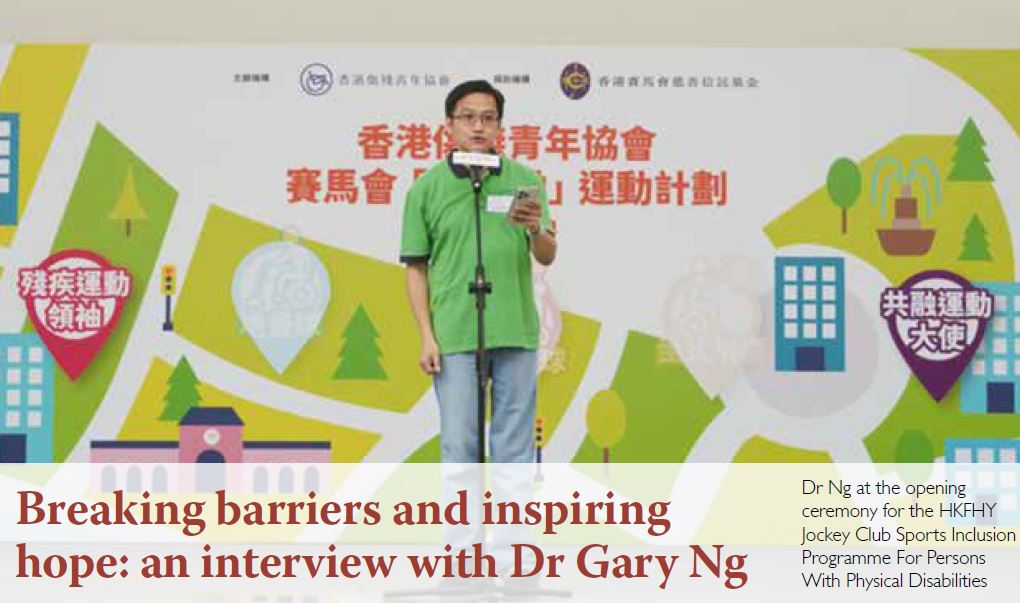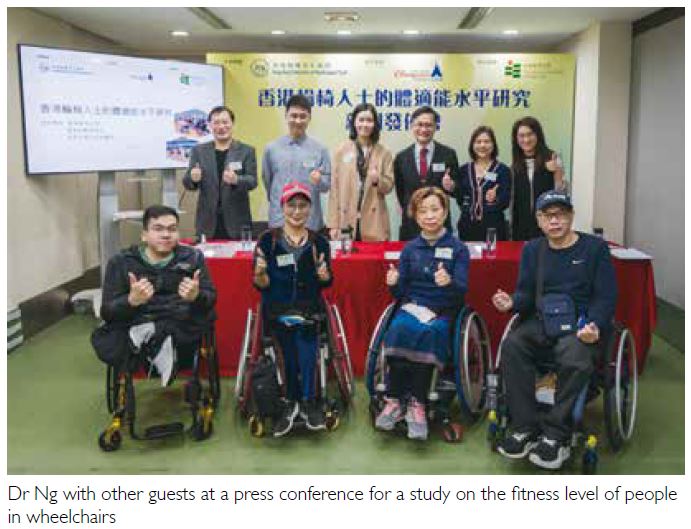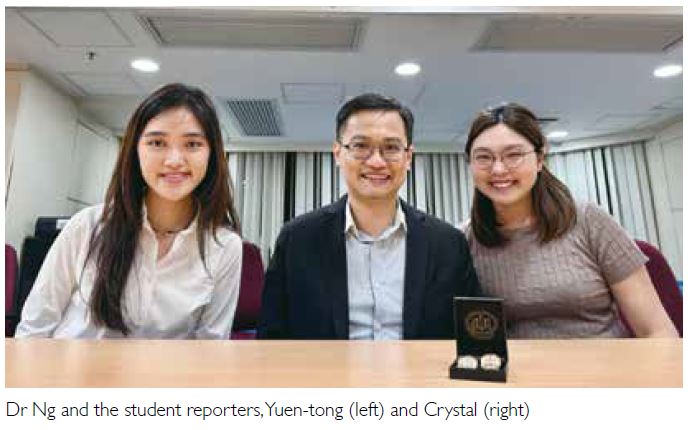© Hong Kong Academy of Medicine. CC BY-NC-ND 4.0
HEALTHCARE FOR SOCIETY
Breaking barriers and inspiring hope: an interview with Dr Gary Ng
Yuen-tong Law, Crystal Lee
Year 3, The Chinese University of Hong Kong, Hong Kong SAR, China
On Dr Gary Ng’s 14th birthday, he was greeted
with an unpleasant surprise: he had malignant
osteosarcoma in his left leg, which required
immediate chemotherapy and eventual amputation.
However, he was undaunted by the subsequent
mobility restrictions—this situation inspired him
to devote his life to medicine and volunteering
to help others in need. In recognition of his effort
and perseverance, he has been a proud recipient of
multiple awards, such as the Ten Outstanding Young
Persons in 2020, the 8th Hong Kong Volunteer
Award 2020, the Outstanding Disabled Persons
Award 2002, the Ten Warriors of Regeneration
Selection 1996, and many others. In addition, he is
the current chairperson of the Hong Kong Federation
of Handicapped Youth (HKFHY).
The Hong Kong Federation of Handicapped
Youth, established in 1970, aims to promote the spirit
of self-help among handicapped young people and
allow smooth societal integration of underprivileged
groups. It strives to achieve these objectives by
providing services to disabled individuals and
advocating for policy changes to create a barrier-free
society. The HKFHY also collaborates with other
organisations to arrange improvements in public
facilities, with the goal of allowing handicapped
individuals to regain a sense of independence and
self-sufficiency while raising public awareness.
Dr Ng’s volunteer work began just after his
graduation from secondary school, long before he
joined the HKFHY. He was invited to give talks at
secondary schools and to share his extraordinary
experiences with cancer patients who were facing the
same challenges as he had. Believing in the balance between quantity and quality, he was determined to
motivate others with his story with different delivery
methods. When asked about the effectiveness of his
talks, Dr Ng replied, ‘If even one person remembers
my message after my talk and takes my lessons to
heart, I have already succeeded.’ He recalled one
memorable story involving a tour guide who had
osteosarcoma. The guide adamantly refused to
undergo leg amputation, concerned that impaired
mobility would severely affect his livelihood. In
desperation, a volunteer organisation contacted Dr
Ng, asking him to persuade the guide to undergo the
amputation surgery. After hearing Dr Ng’s story, the
guide was sufficiently moved by the doctor’s cancer
journey that he chose to undergo the amputation
procedure—this decision both saved his life and
improved his long-term quality of life. Dr Ng believes
that his volunteer work has provided an opportunity
for self-reflection because his unique perspective as
both a cancer survivor and doctor makes his stories
compelling and relatable to the general public. His
journey inspires others to accept themselves, instead
of dwelling on their misfortunes, and to face the
challenges ahead with vigour and enthusiasm.
Years later, as chairperson of the HKFHY,
Dr Ng’s outreach has extended beyond the
youth population. Notable initiatives include the
establishment of social enterprises such as ‘First
Sense Design’ and ‘Flower Workshop’. These
enterprises offer job opportunities for disabled
individuals and provide them with a sense of
fulfilment. Recognising that disabled individuals
have limited physical mobility and lacks sporting
habit, Dr Ng is enthusiastic to promote ‘Sports of All’ which encourages disabled individuals to participate
and develop an interest in sport. Furthermore,
Dr Ng has been an active member of various sub-committees,
providing insights from the perspective
of disabled users and advocating for practical
follow-up measures in areas such as malls and the
transportation sector. These include increasing the
availability of elevators at malls, or installation of
mirrors inside of the elevators for wheelchair user’s
easy access. Dr Ng’s work encompasses a broad
range of activities, from serving individual users to
persistently advocating for policy changes.
Over the years, although Dr Ng has
transitioned from patient to doctor, his unwavering
commitment to serving the handicapped community
has never faded. While studying medicine, Dr Ng
coincidentally discovered that the survival rate for
the type of surgery he had undergone is alarmingly
low: approximately 3% after 3 years. This finding
reinforced his firm belief in giving back to society.
Engagement in volunteer services has provided Dr
Ng with continuous opportunities for reflection,
reminding him of how fortunate he is to have
recovered, to have encountered compassionate
medical professionals, and to now serve as a beacon
of hope for others. Thus, volunteering benefits the
individuals receiving services while serving as a
means of self-improvement and self-reflection.
Dr Ng’s work has not been free of challenges
and setbacks, particularly in terms of facilitating
employment opportunities for disabled individuals
during Hong Kong’s economic recessions. Although
handicapped individuals exhibit a higher level
of loyalty and dedication to their work, as Dr Ng
has suggested, some complex considerations and
obstacles persist. For instance, employers often
express hesitation regarding the termination of
handicapped employees who do not meet the
required job standards because this termination may
be perceived as a violation of anti-discrimination
laws. Businesses have also raised concerns about
the financial implications of office space renovation
to include necessary facilities, such as barrierfree
washrooms and elevators. It is particularly
challenging for Dr Ng to act as a bridge between
the disabled community and the business sector—seeking opportunities for the disabled yet balancing
the concerns from the business field at the same
time.
With deep gratitude and humility, Dr Ng
pledges to lead the HKFHY to new heights, with the
goal of increasing disabled community involvement
in community planning and design. During visits to
explore infrastructures in other countries, Dr Ng
was especially impressed to see disabled individuals
actively participating in the design process, which
resulted in truly inclusive facilities such as lowered
check-in counters that can accommodate wheelchair users. Dr Ng has placed great emphasis on the
importance of providing disabled individuals with
abundant opportunities to broaden their horizons
and increase their knowledge through field trips and
continuous visits. By enabling disabled individuals
to ‘see more’ and ‘hear more’, this approach allows
them to acquire valuable insights and experiences
that can be effectively applied within Hong Kong.
The organisation also aspires to work to closely with
other regions, such as helping mainland China to
develop barrier-free tourism.
Throughout our chat with Dr Ng, he consistently
emphasised the importance of inclusivity. As
someone who is both disabled and a volunteer, Dr
Ng firmly believes that true inclusivity extends
beyond merely assisting disabled individuals—it is the mutual respect between different disabled and
the society, and the understanding that everyone
could play an important role in society that matters
the most. ‘When you have the opportunity to work
with someone who is disabled, express gratitude
by saying, “Thank you for providing me with the opportunity to better understand you”, instead of
“Thank you for giving me a chance to help you,” ’
advises Dr Ng. Ultimately, the deepest motivation
arises from a genuine and sincere desire to serve,
along with a firm belief in making our beloved city,
Hong Kong, a better place.

Figure 1. Dr Ng at the opening ceremony for the HKFHY Jockey Club Sports Inclusion Programme For Persons With Physical Disabilities

Figure 2. Dr Ng with other guests at a press conference for a study on the fitness level of people in wheelchairs


